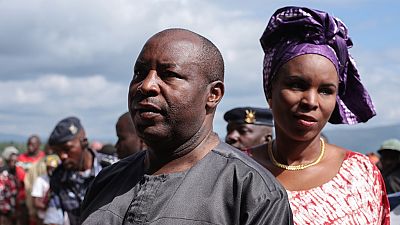
BURUNDI
The candidate of Burundi’s ruling party, Évariste Ndayishimiye, is on course for a landslide victory in the 20 May presidential election organised by the Electoral Commission, according to partial results released so far.
The National Independent Electoral Commission (Céni) will announce the results of the presidential and legislative elections, after publishing the results of the communal elections. The final figures will be made public on 4 June.
The ruling CNDD-FDD party is the clear winner in all three elections, according to the partial results of the country’s 119 municipalities published by the Burundian media since Thursday.
If there is no violence, everyone will be satisfied with the result that is going to be announced, he predicted. We are going to be positive, taking note of the new face of the CNDD-FDD government (...) in order to encourage change and political openness.
General Ndayishimiye, 52, is expected to succeed President Pierre Nkurunziza. Nkurunziza, who has been in power since 2005, had decided not to stand for a fourth term and had dubbed him his “heir.
The main opposition candidate, Agathon Rwasa, president of the National Council for Liberty (CNL), has already described these results as “fanciful” and accused the government of “cheating” and “pure manipulation”.
Election held in the midst of COVID-19
According to partial results compiled by AFP covering 105 communes, Mr. Ndayishimiye obtained an absolute majority of the votes in 101 communes. In the four communes where he is defeated, he never gets less than 43% of the vote. He obtains at least 70% of the votes in 66 communes and more than 50% in 35 others.
Even if these elections, maintained despite the epidemic of new coronavirus, were generally held in calm, the CNL denounces since Wednesday the pressure exerted on its assessors, some of whom were arrested, as well as massive frauds.
Mr Rwasa thus obtains only 24.6% of the votes in Kabezi, a commune in the province of Bujumbura-rural (west) which is nevertheless considered one of its historical strongholds.
The CNL is also outraged at the case of the Musigati commune (west), where Mr. Ndayishimiye received 99.9% of the vote. The turnout rate there is estimated at more than 102%, according to an AFP calculation.
Numerous witnesses throughout the country and Burundian journalists confirmed to AFP the validity of these accusations, even though no UN or African Union observer mission had been authorised by the government.
Analysts expected a duel between General Ndayishimiye and Agathon Rwasa, which drew crowds during the campaign, which was marred by violence and arbitrary arrests.
A diplomat stationed in Burundi expressed strong doubts about the results. “We were expecting it to happen like this, nobody could imagine for a second that the CNDD-FDD and its generals would cede power in this way,” he told AFP on condition of anonymity.
“If there is no violence, everyone will be satisfied with the result that is going to be announced,” he predicted. “We are going to be positive, taking note of the new face of the CNDD-FDD government (…) in order to encourage change and political openness,” he told AFP.
Belgium, the former colonial power, has already shown a willingness to appease, saying it sees this electoral process as an opportunity to “strengthen” a relationship that has deteriorated since 2015.
Burundi has been under sanctions from its main donors (EU, Belgium, Germany…) since the political crisis of 2015, triggered by Mr. Nkurunziza’s candidacy for a controversial third term, which has left at least 1,200 people dead and forced some 400,000 Burundians to flee the country.
The country is held in an iron grip by the regime, thanks to the Imbonerakure, the CNDD-FDD youth league, and the National Intelligence Service (SNR), which sow terror among the population.
No protests
Agathon Rwasa has already hinted that he would not take to the streets for the time being and would settle for an appeal to the Constitutional Court. Without having any illusions about its outcome, as he considers this body to be under power.
The international community seems ready to accommodate General Ndayishimiye, who is considered to be more conciliatory than Mr Nkurunziza. Even if, as secretary general of the CNDD-FDD since 2016, he has not prevented human rights violations.
It also remains to be seen how “Neva”, his nickname, will be able to emancipate itself from the tutelage of Mr. Nkurunziza, who was elevated to the rank of “supreme guide of patriotism” in February by the National Assembly and will remain the chairman of the party’s highly influential Council of Elders.
If the Céni confirms his victory, Mr Ndayishimiye will be sworn in in August, at the end of Mr Nkurunziza’s seven-year term. He has promised to make the economic recovery of the country his priority.
Burundi is ranked among the three poorest countries in the world according to the World Bank, which estimates that 75% of the population lives below the poverty line, compared to 65% when Mr. Nkurunziza came to power in 2005.
AFP


No comments:
Post a Comment